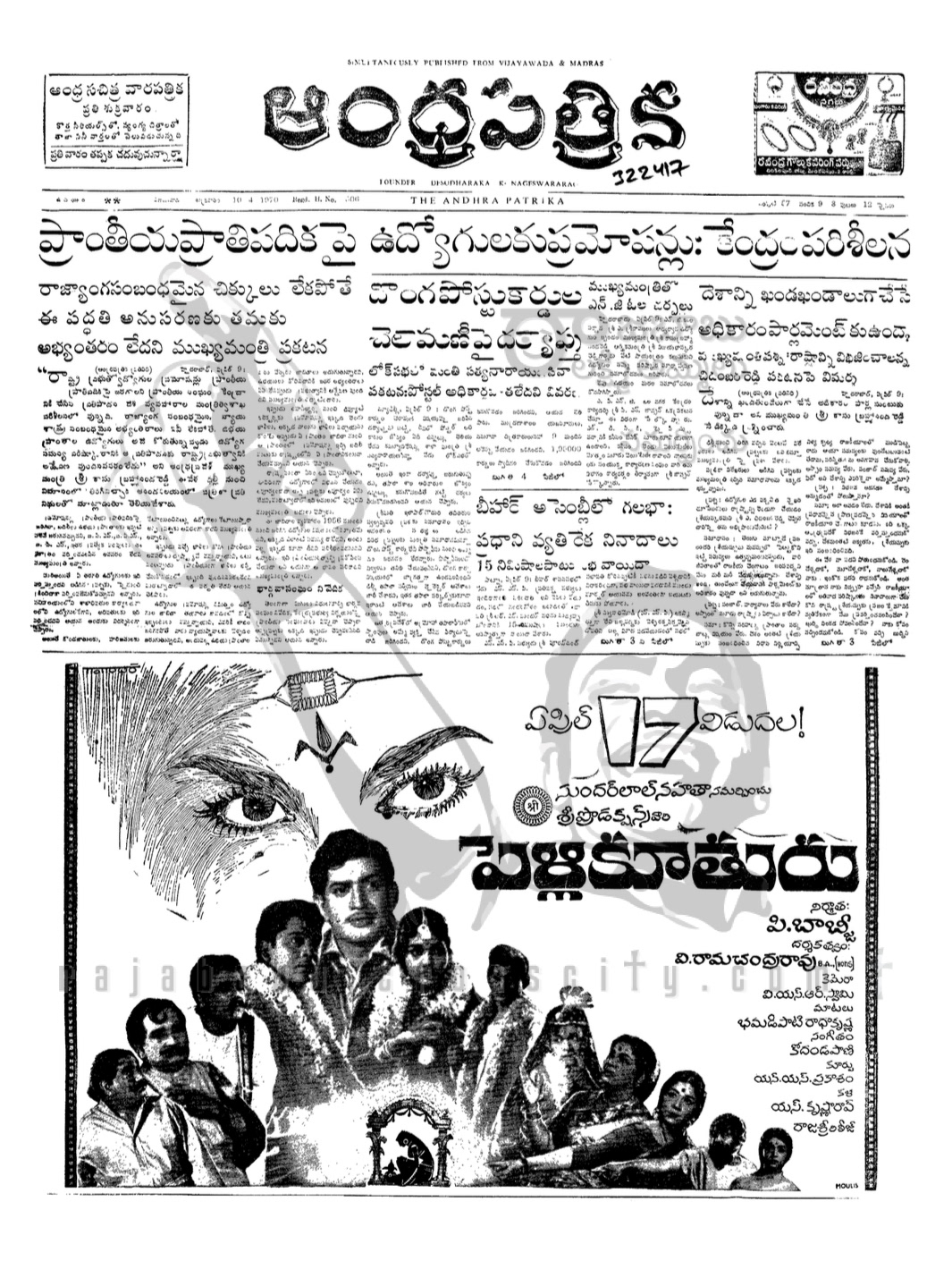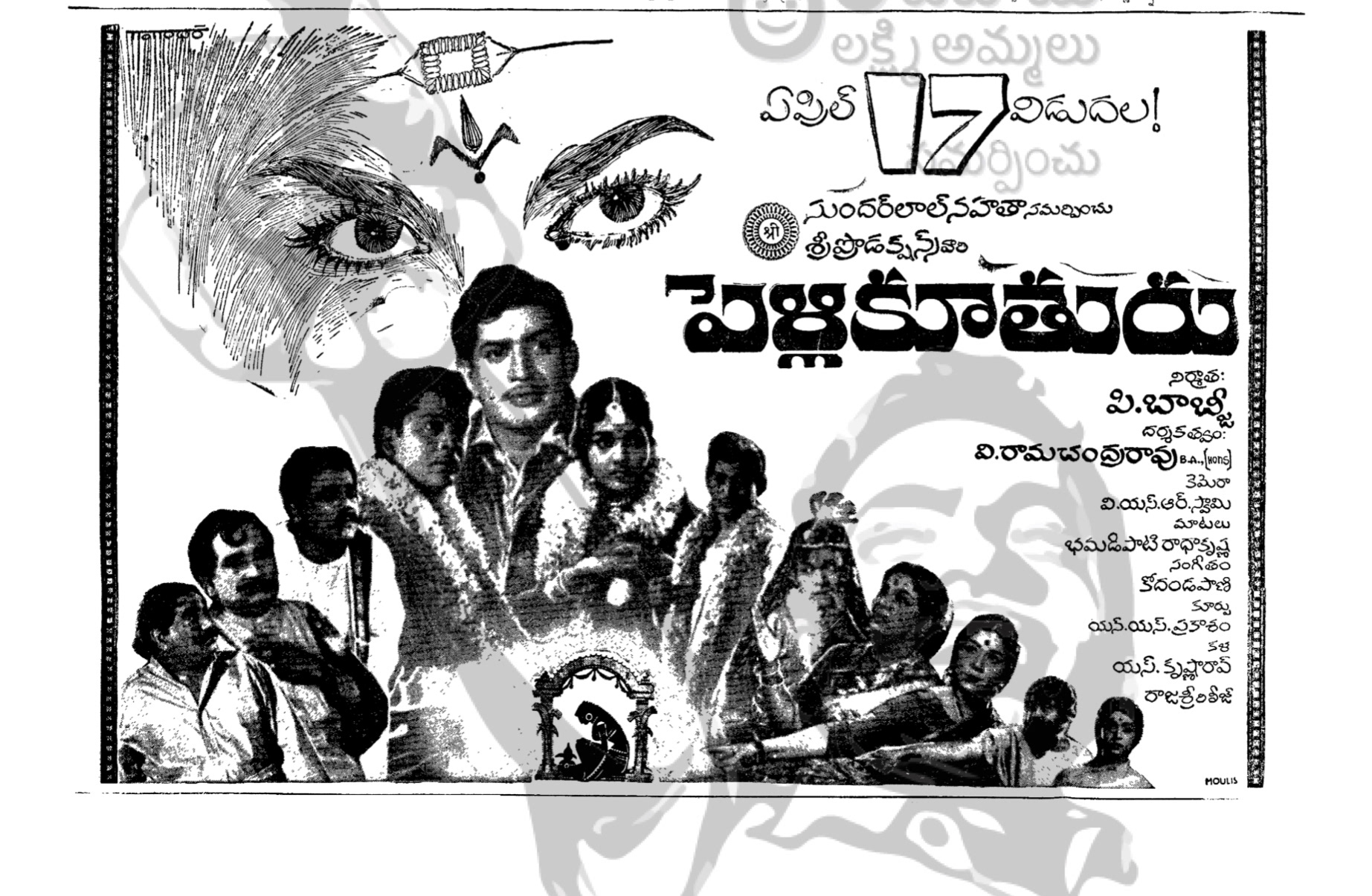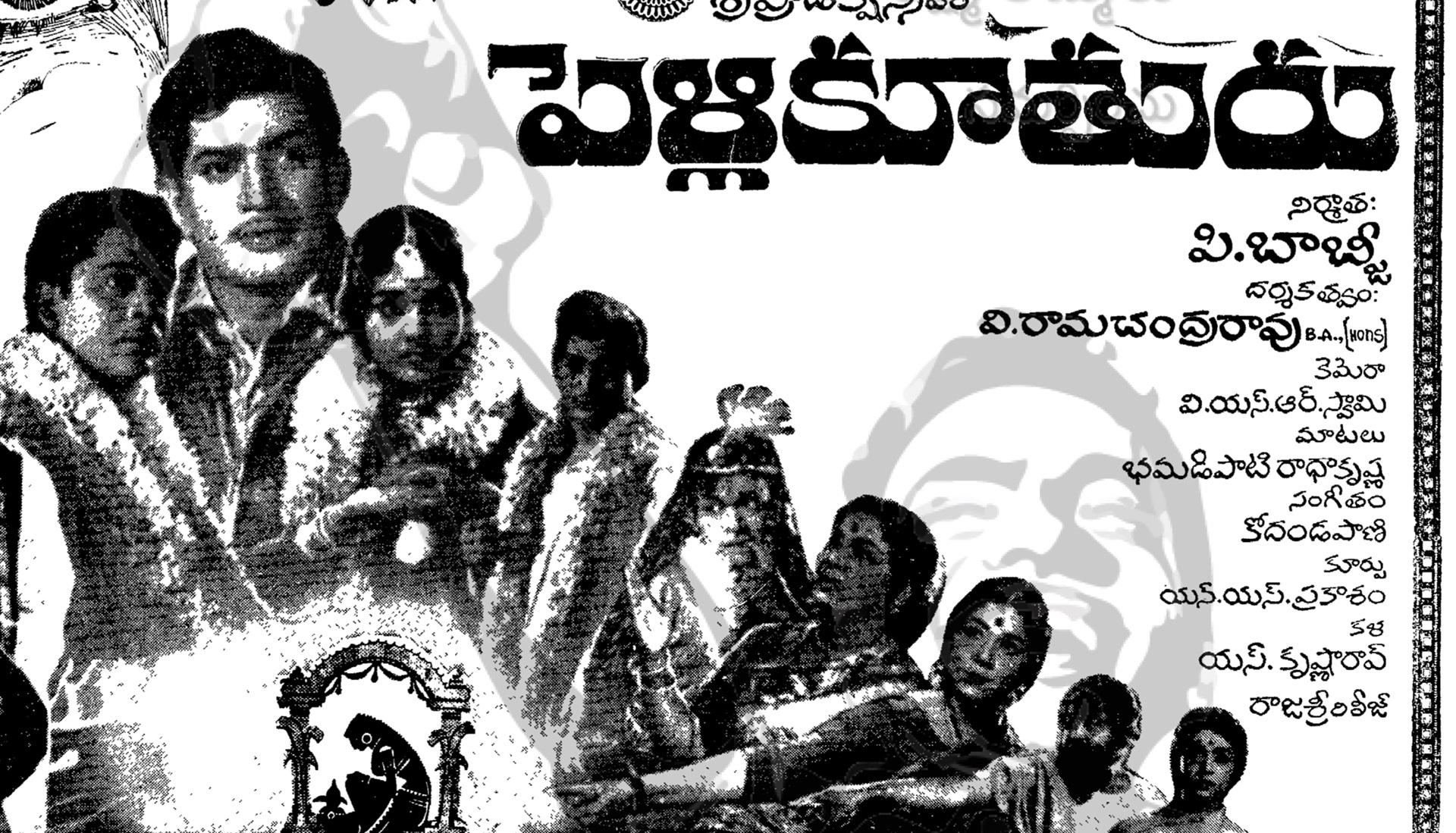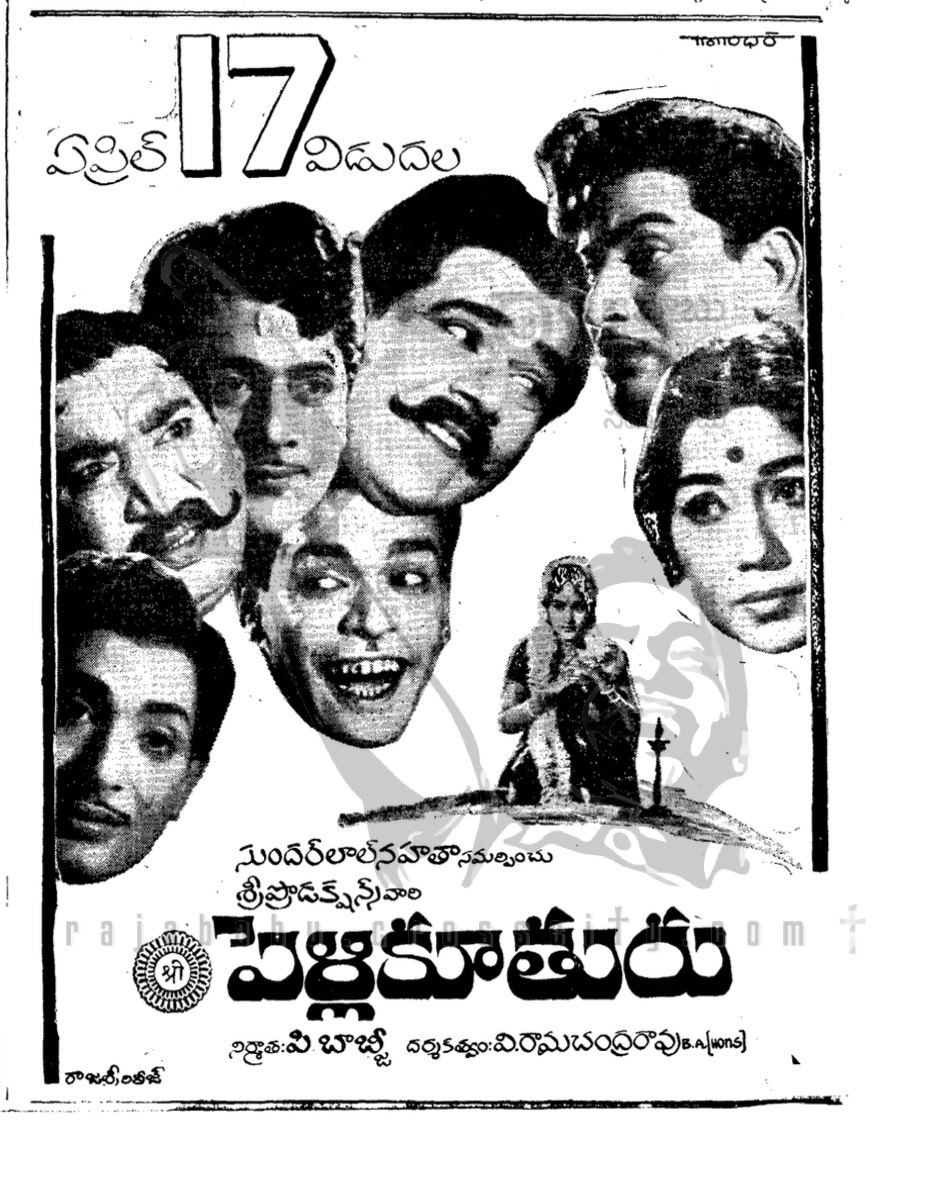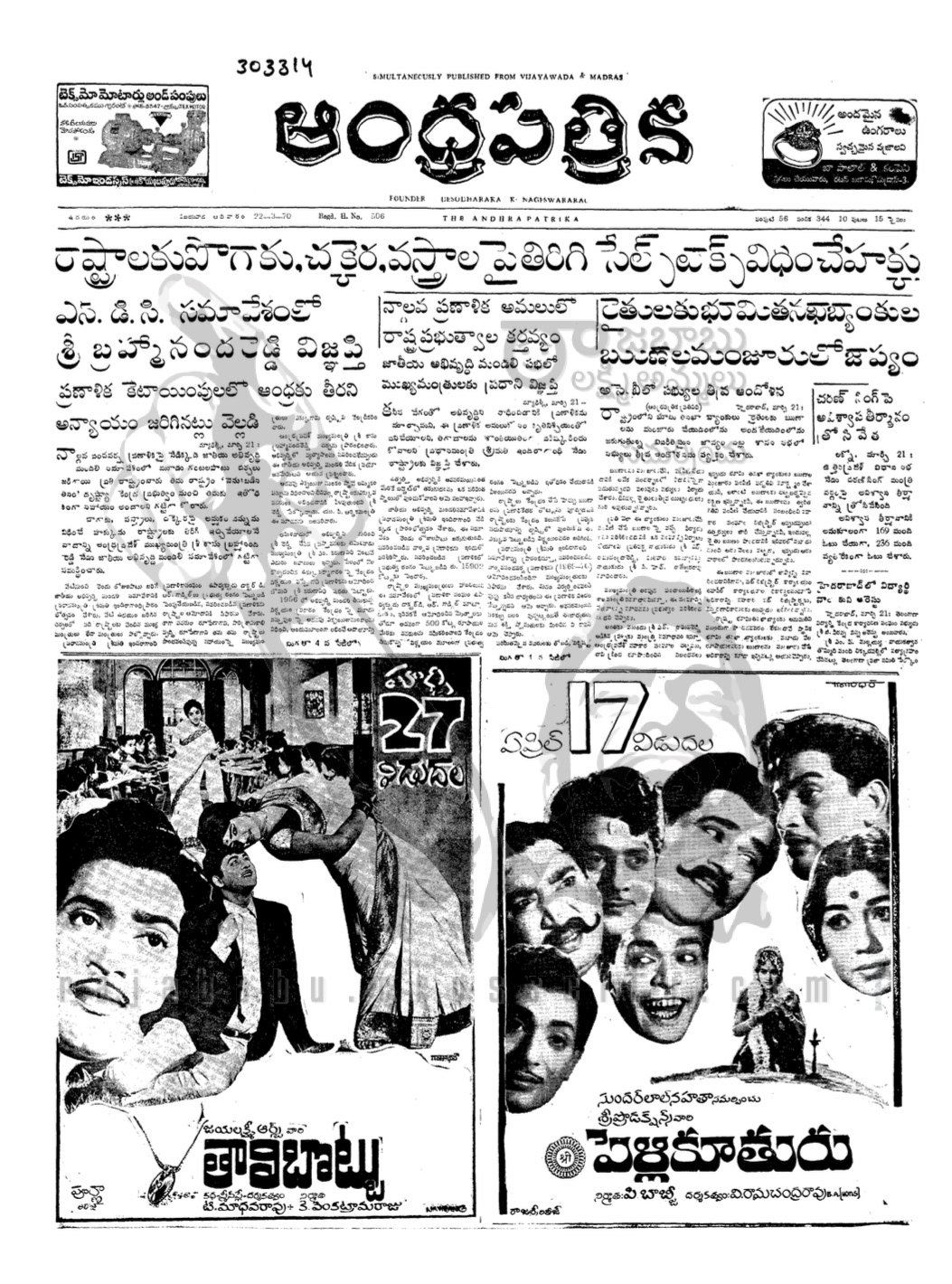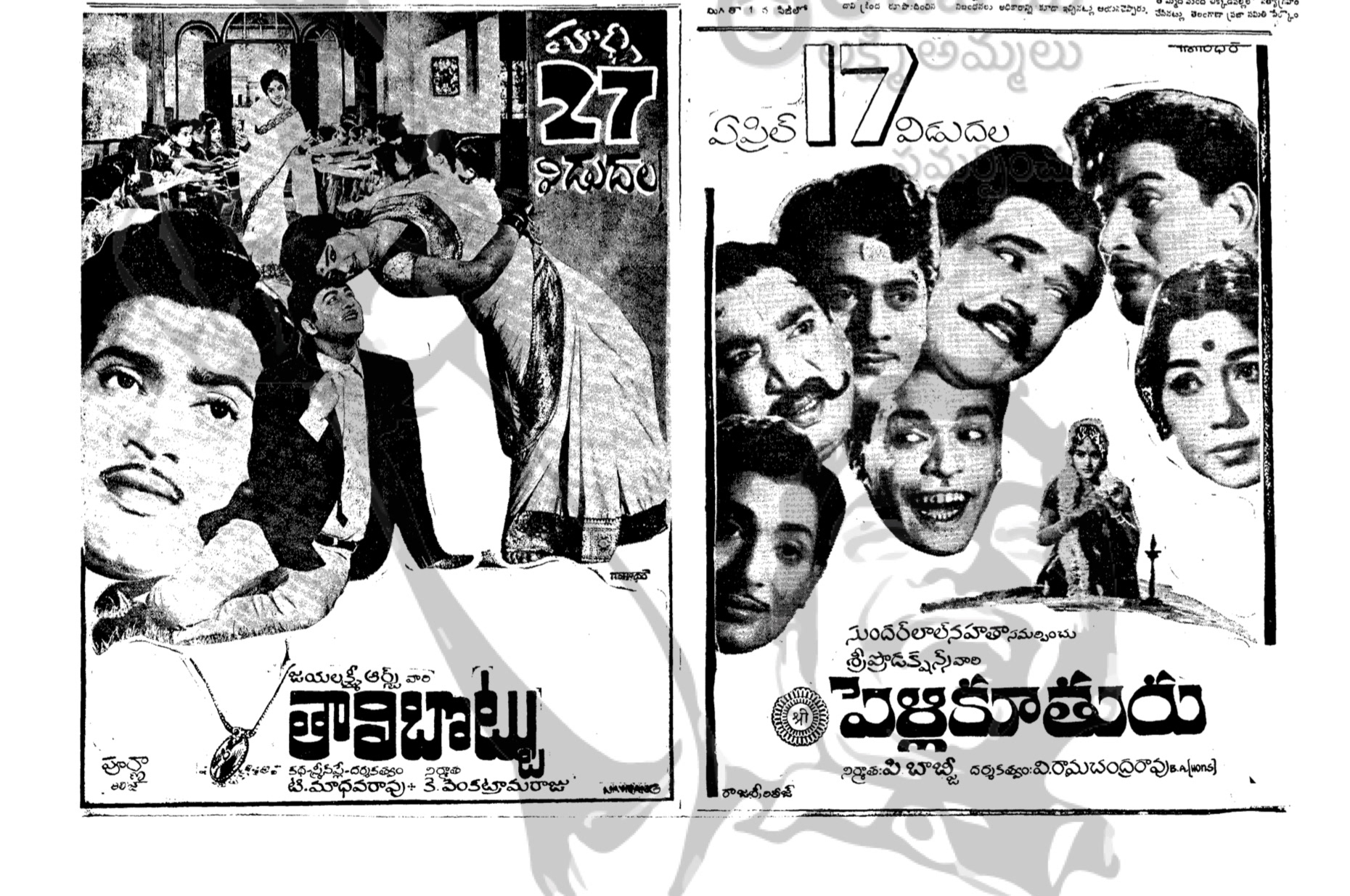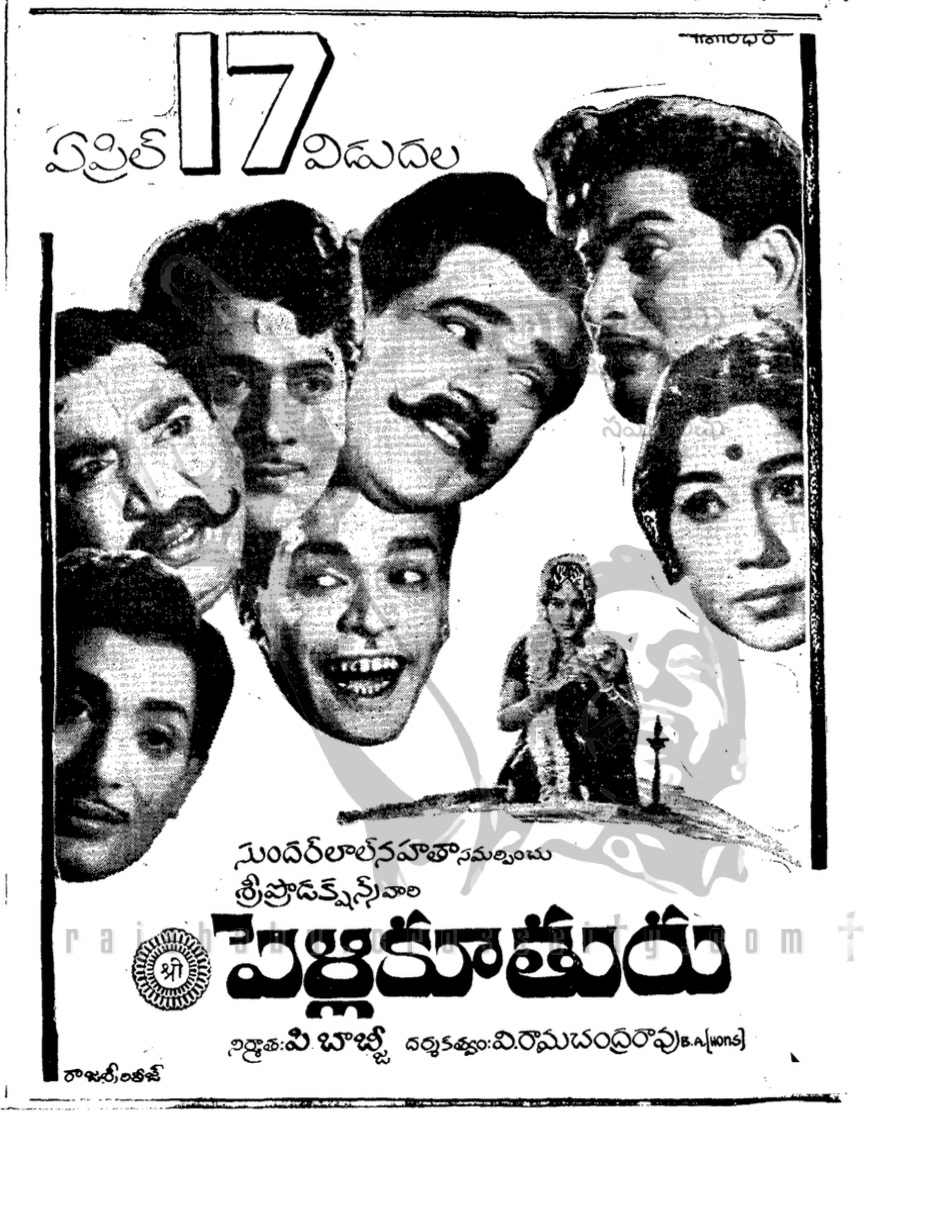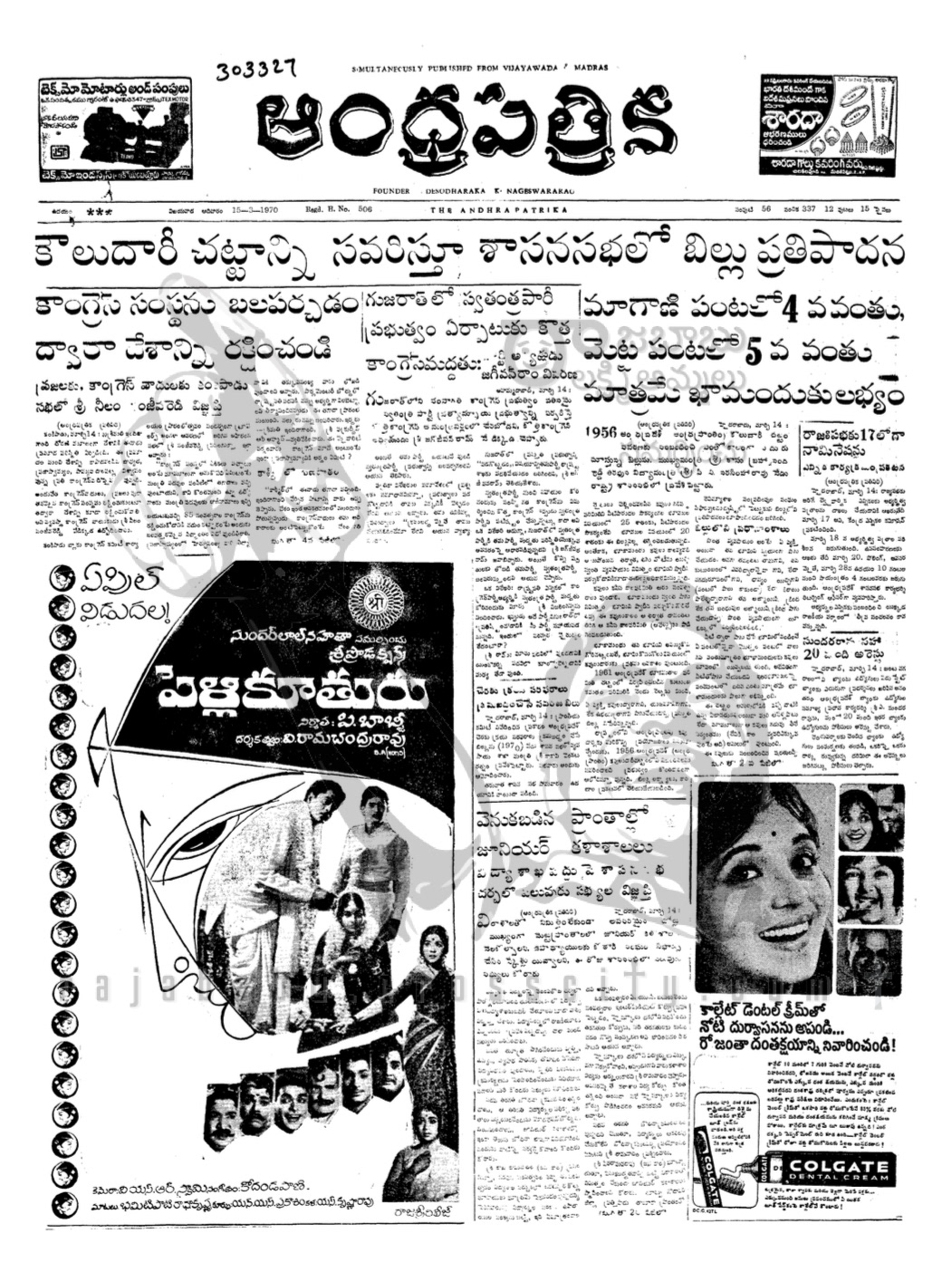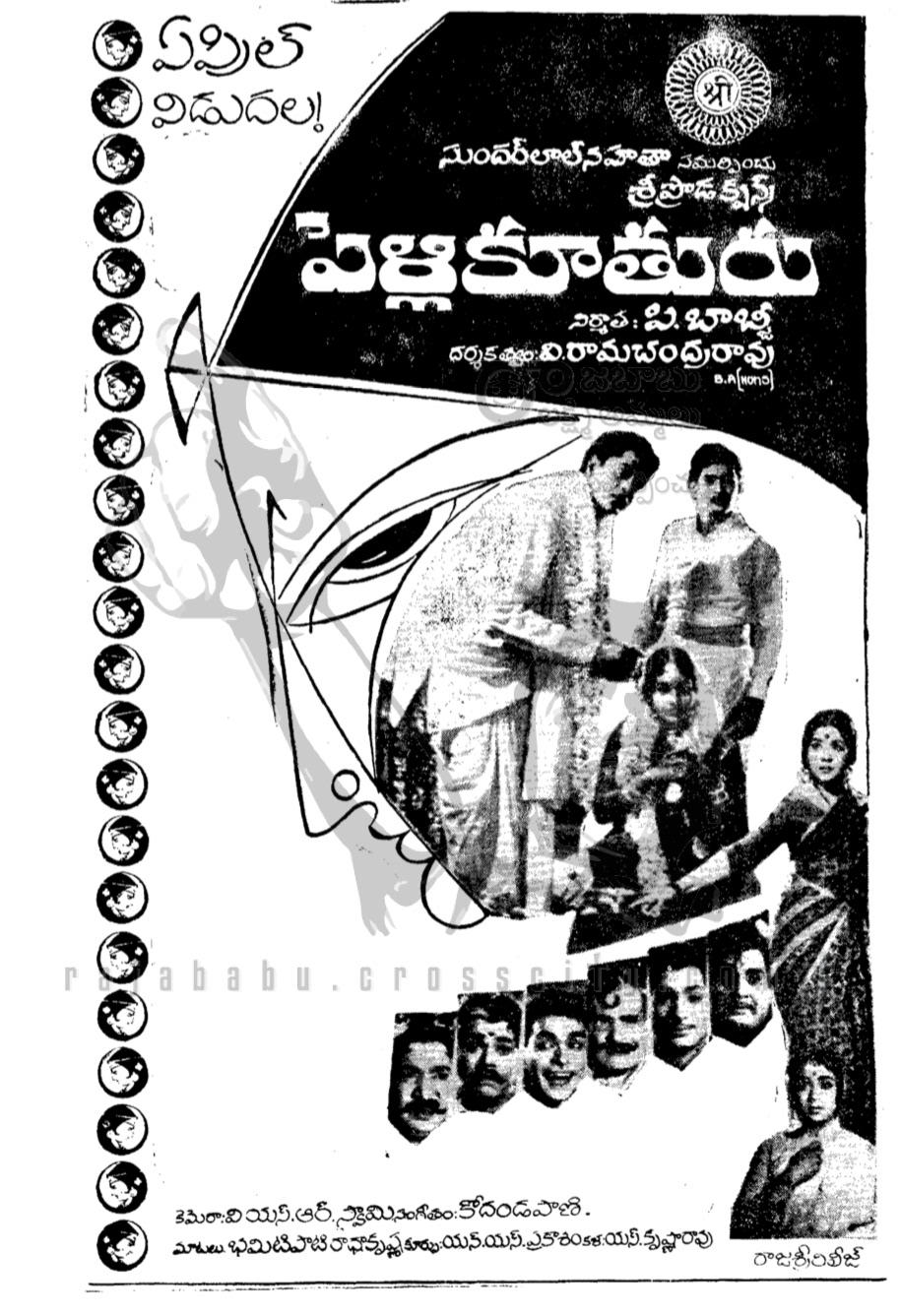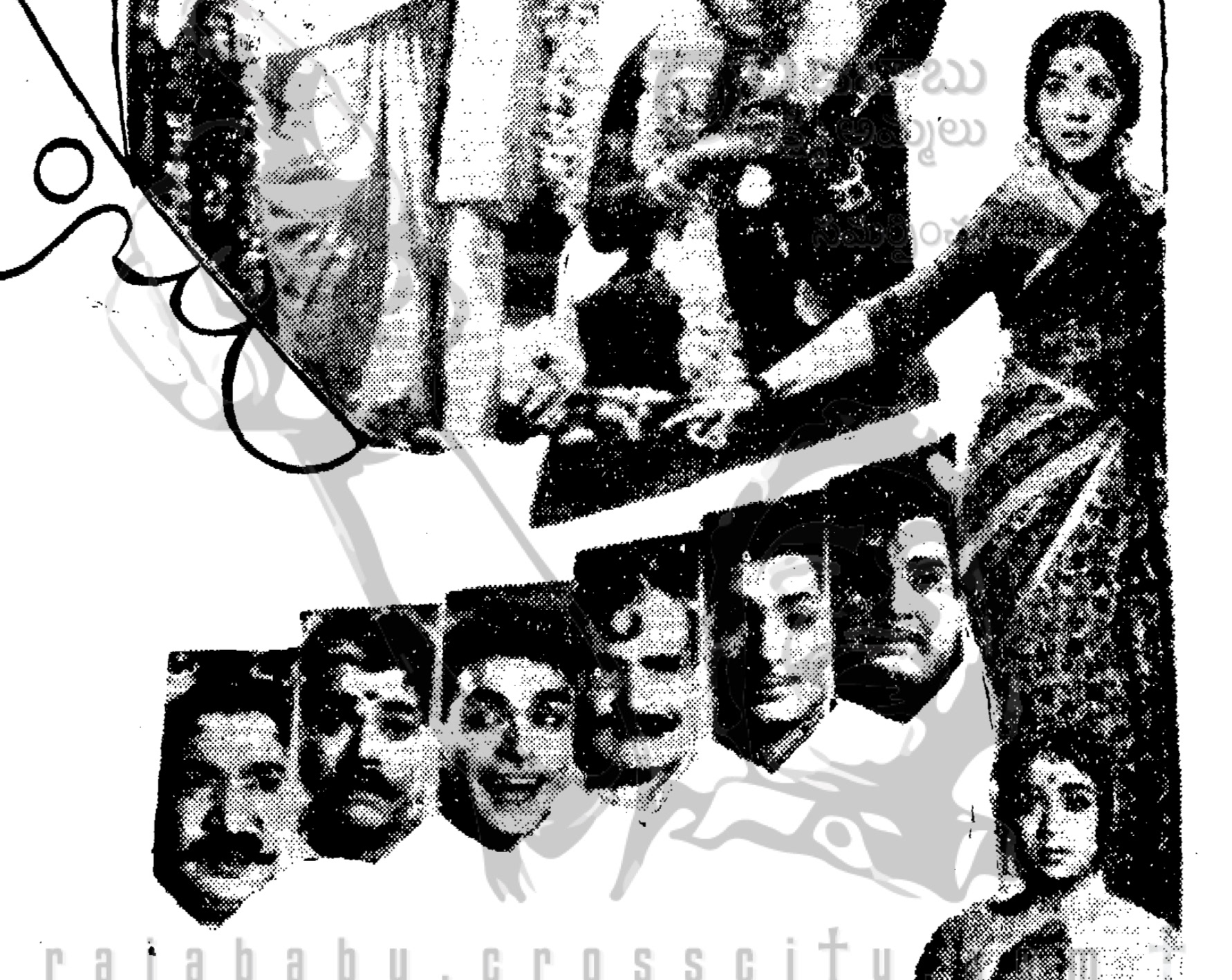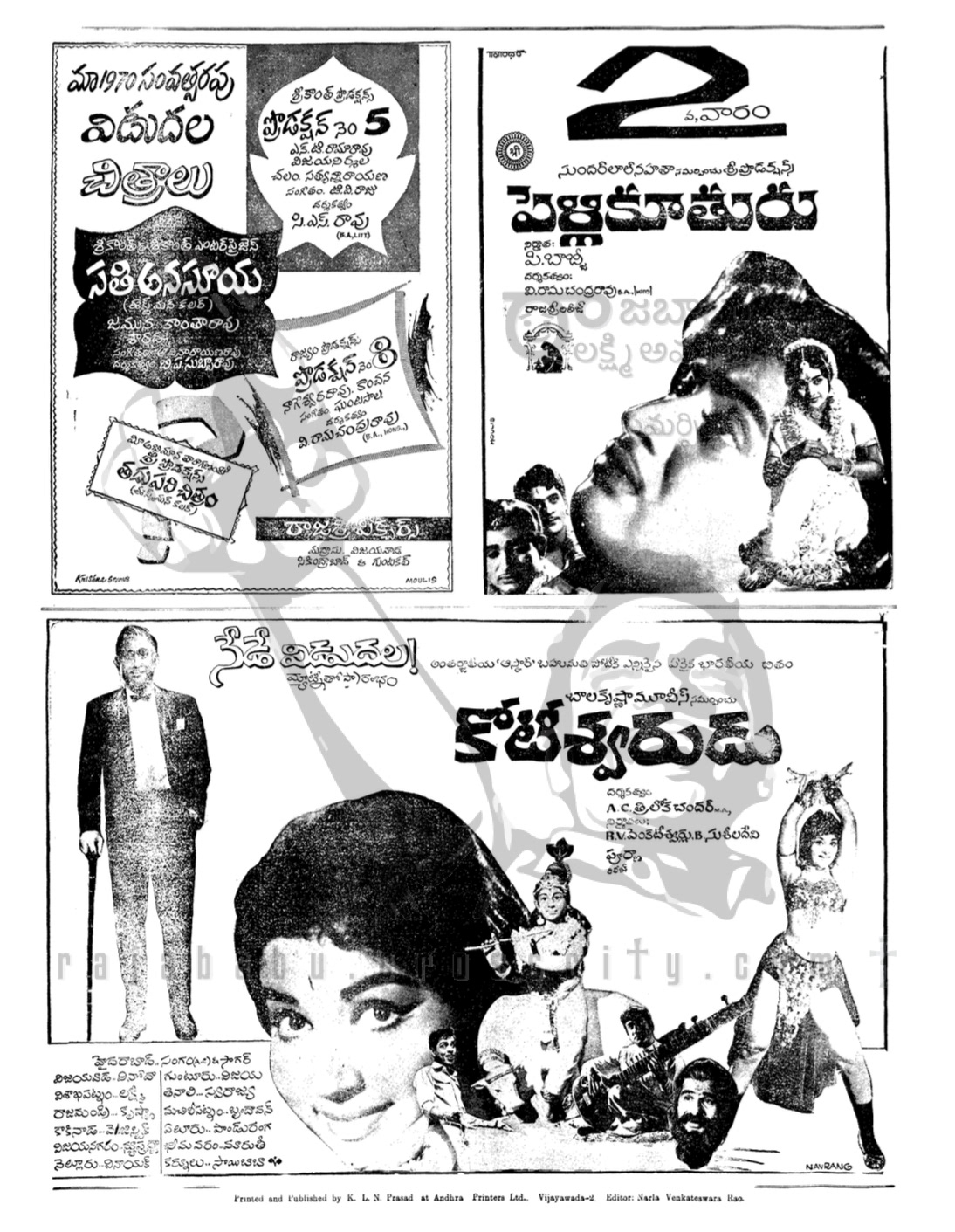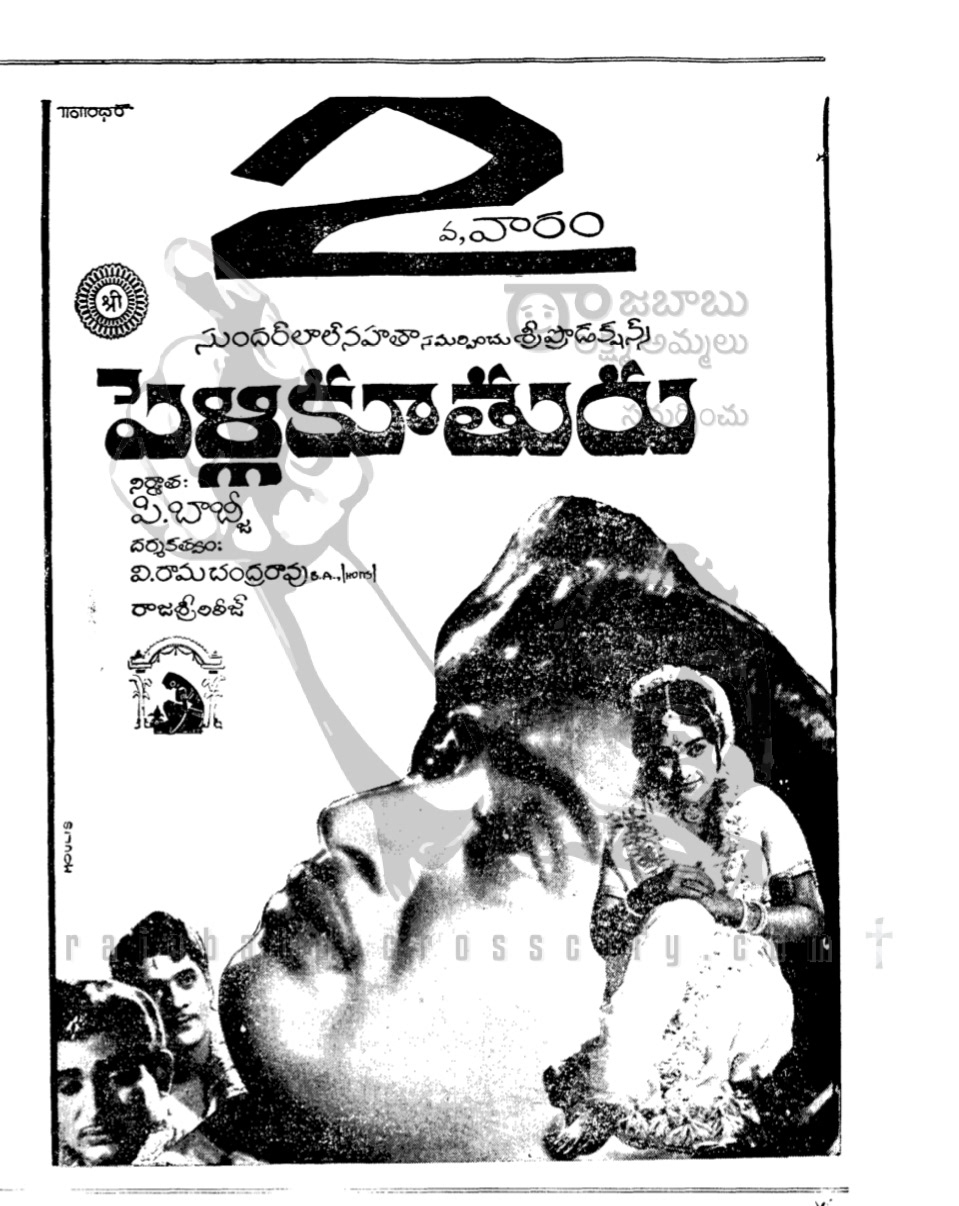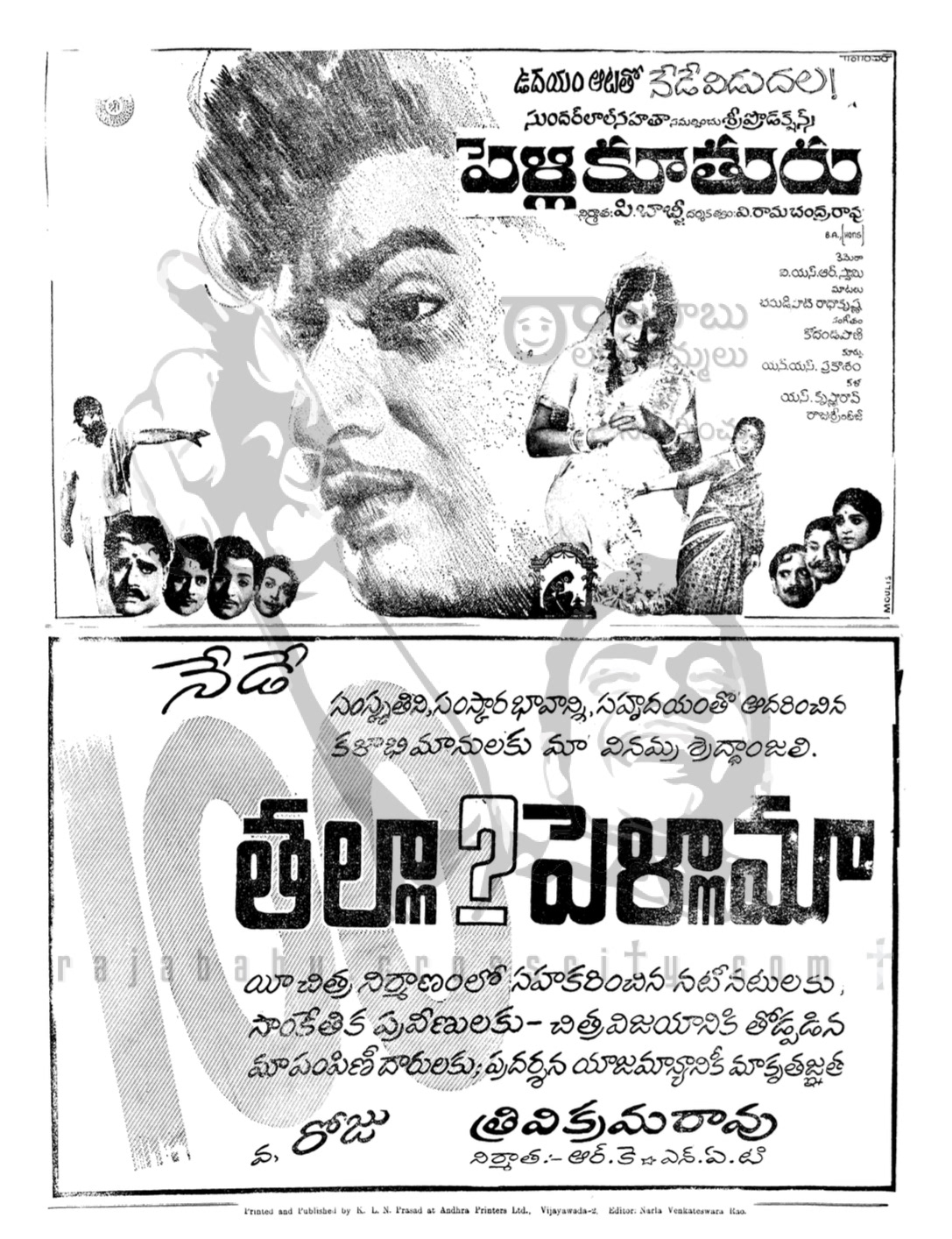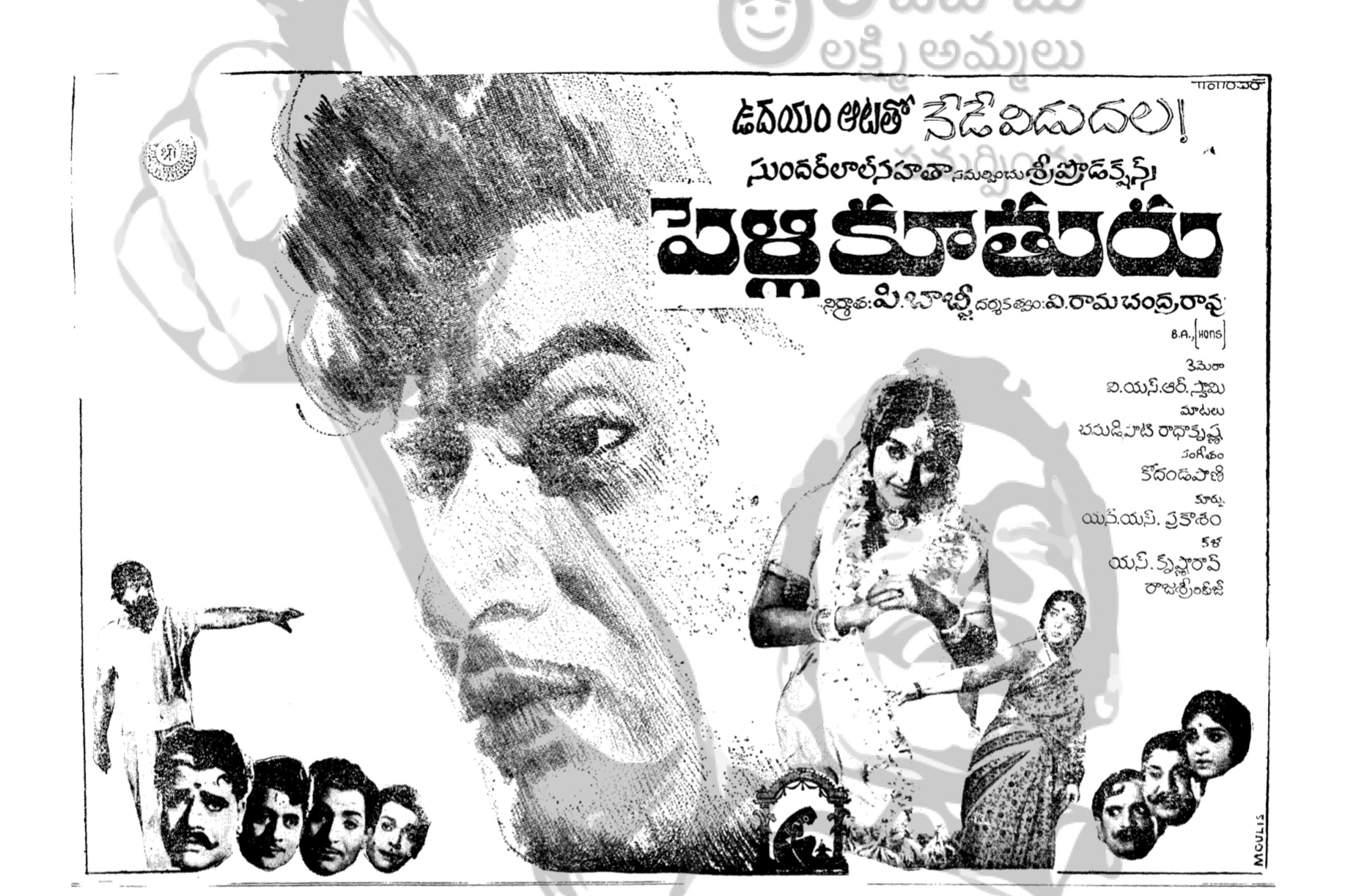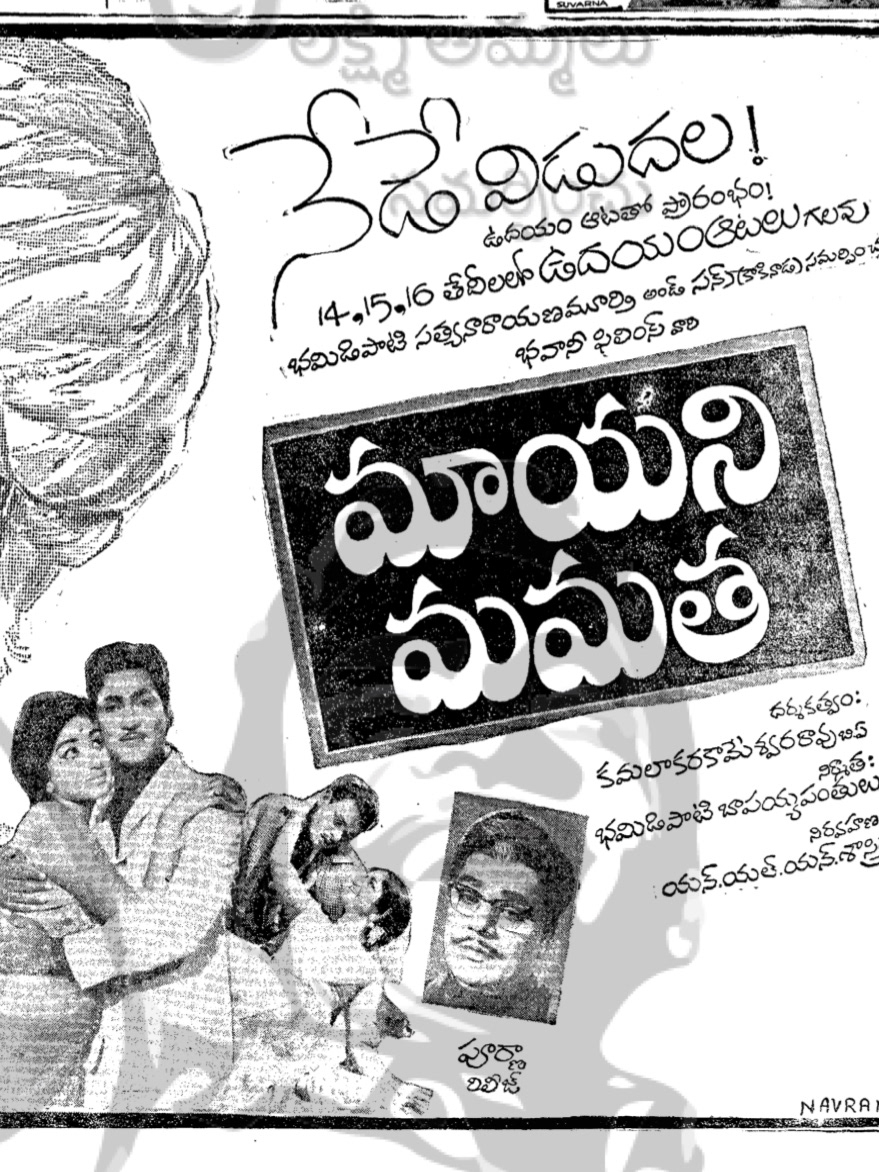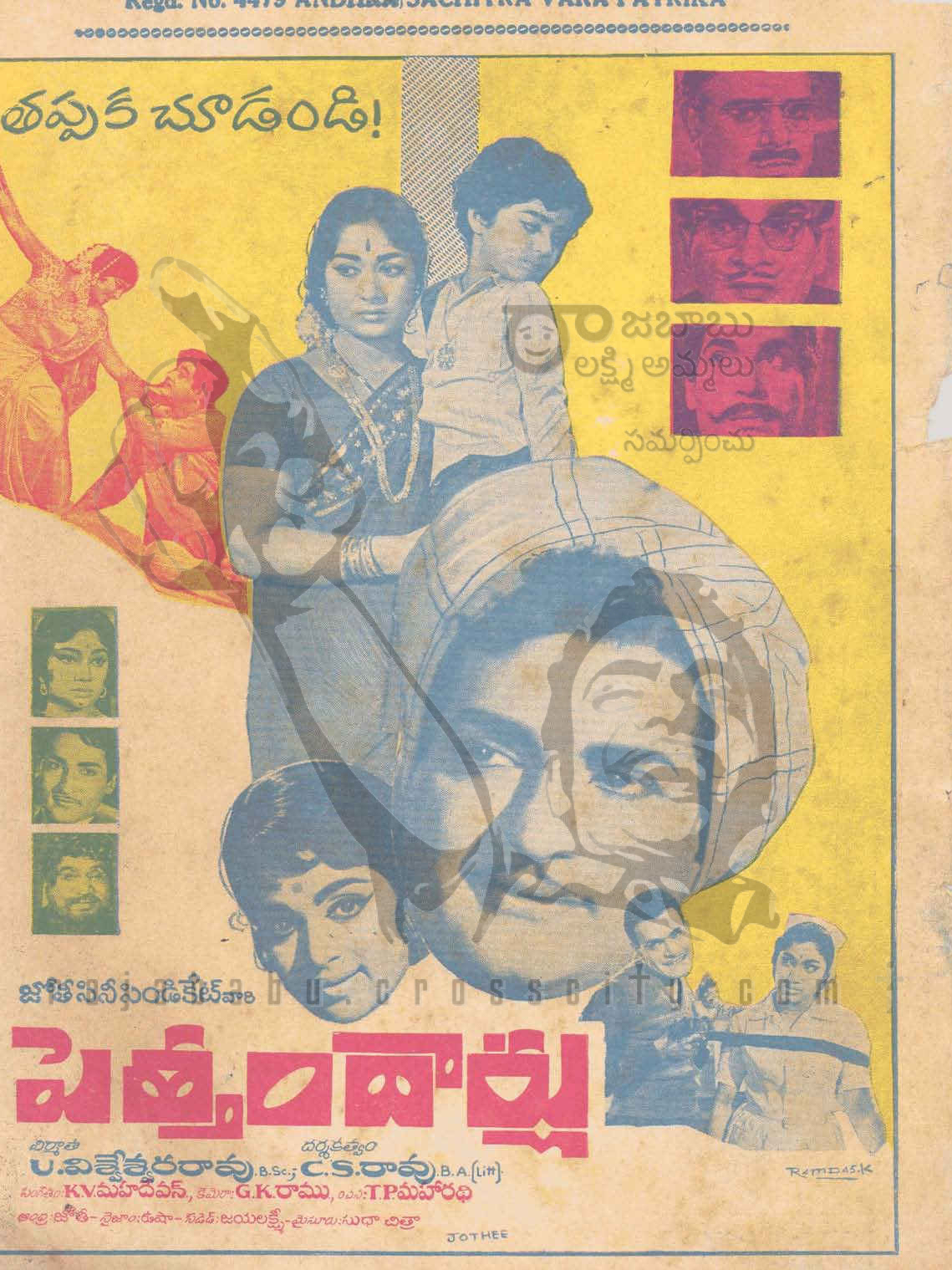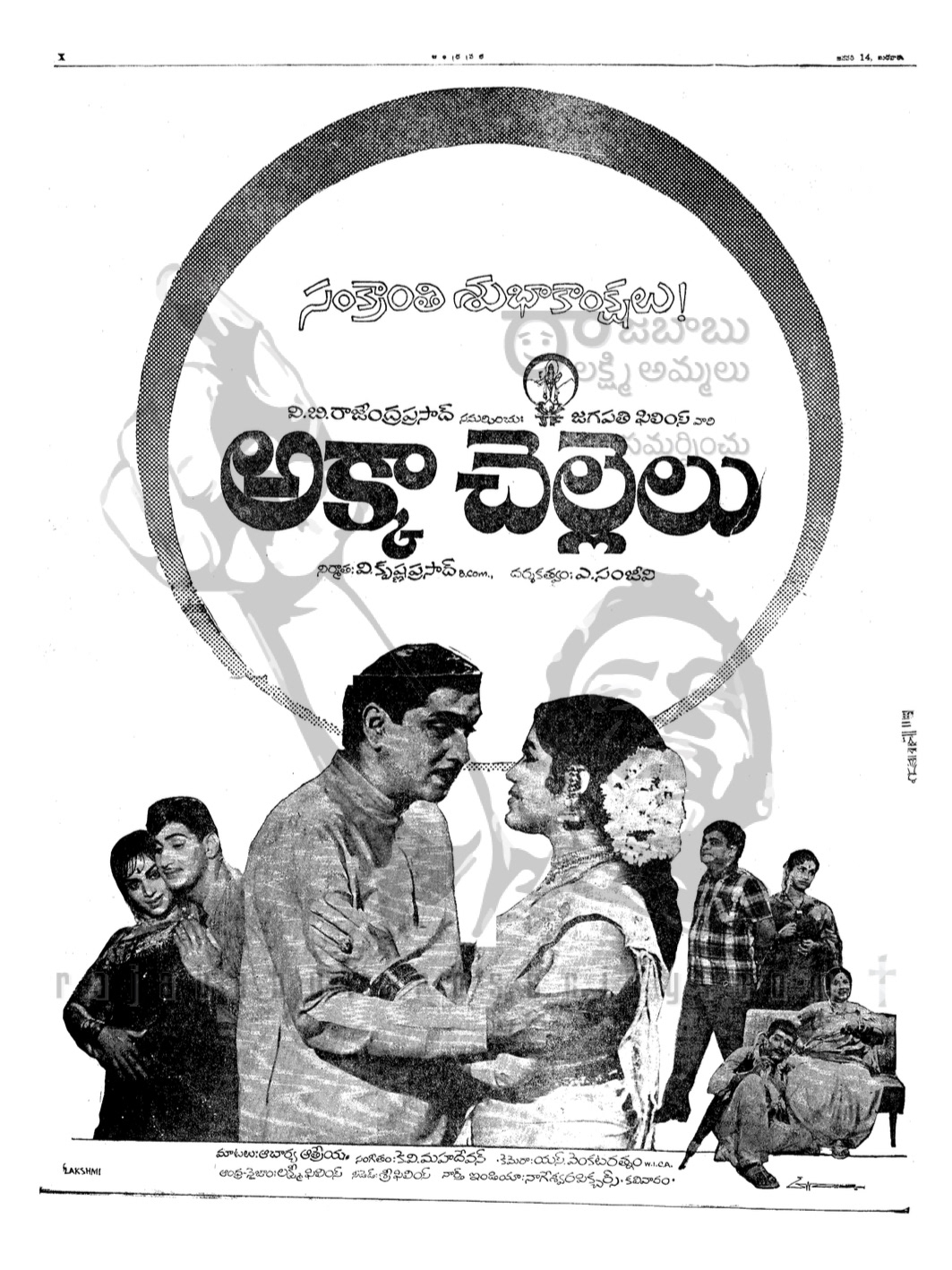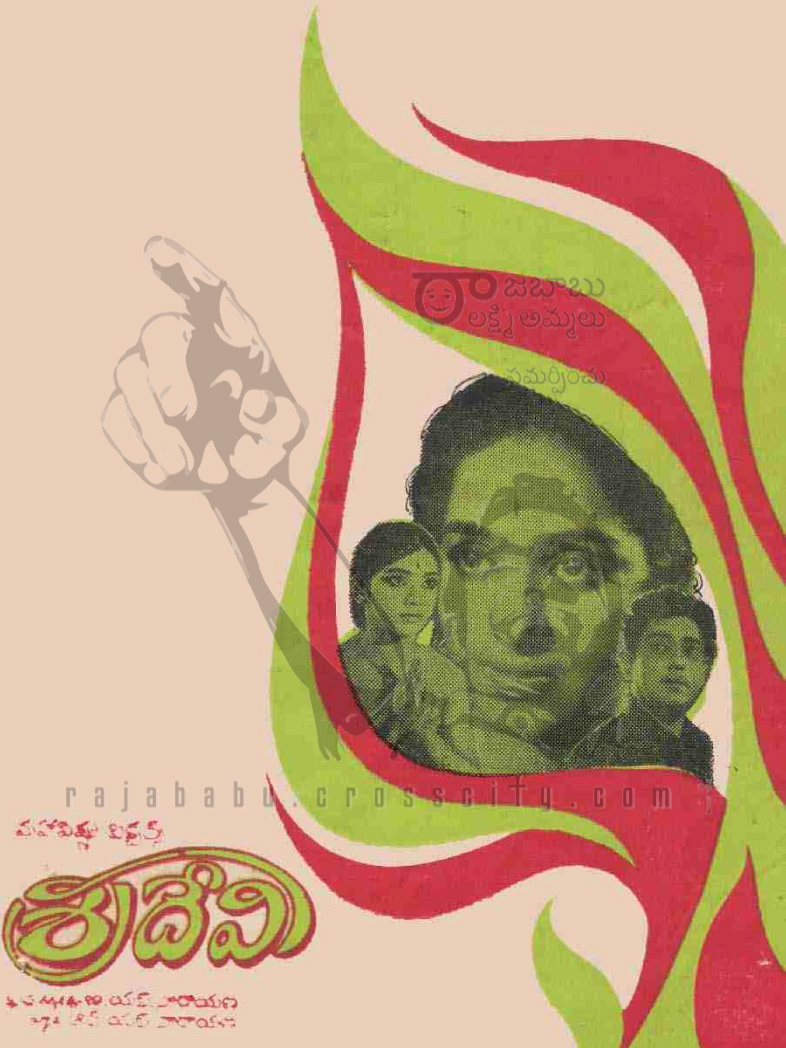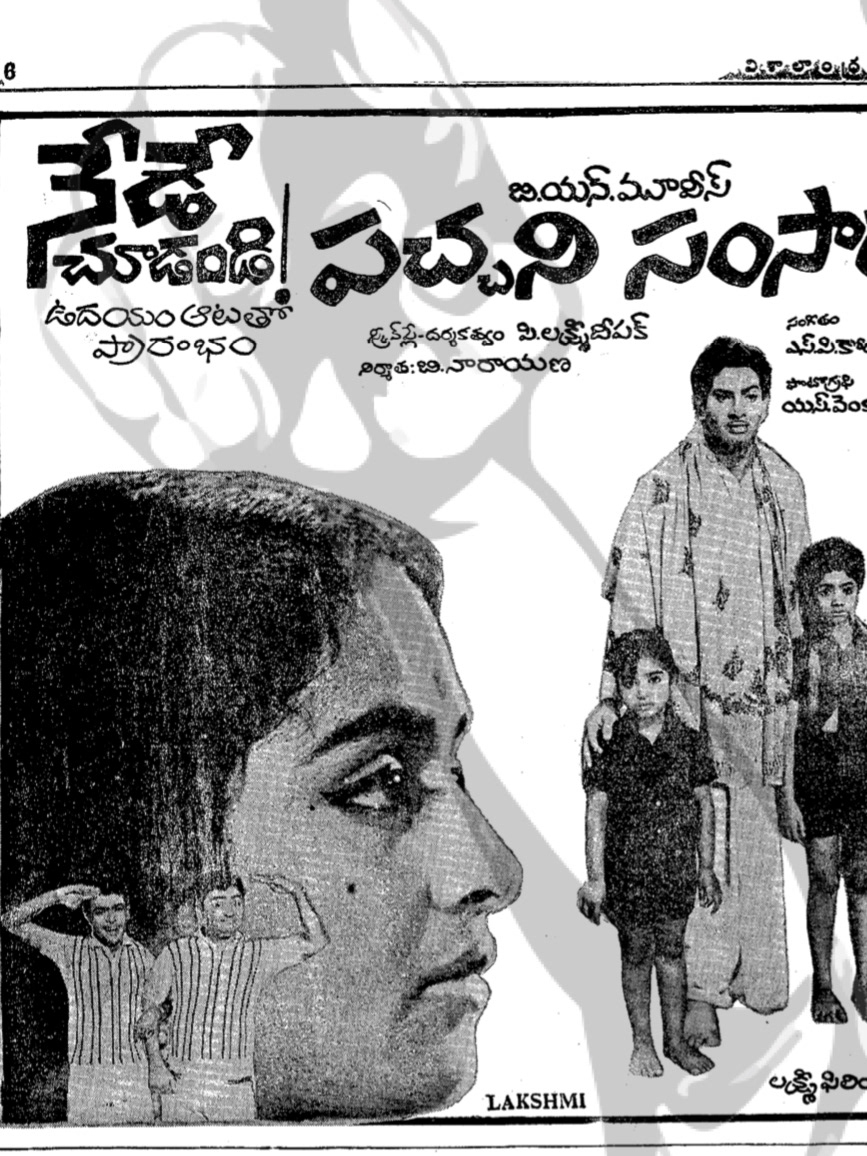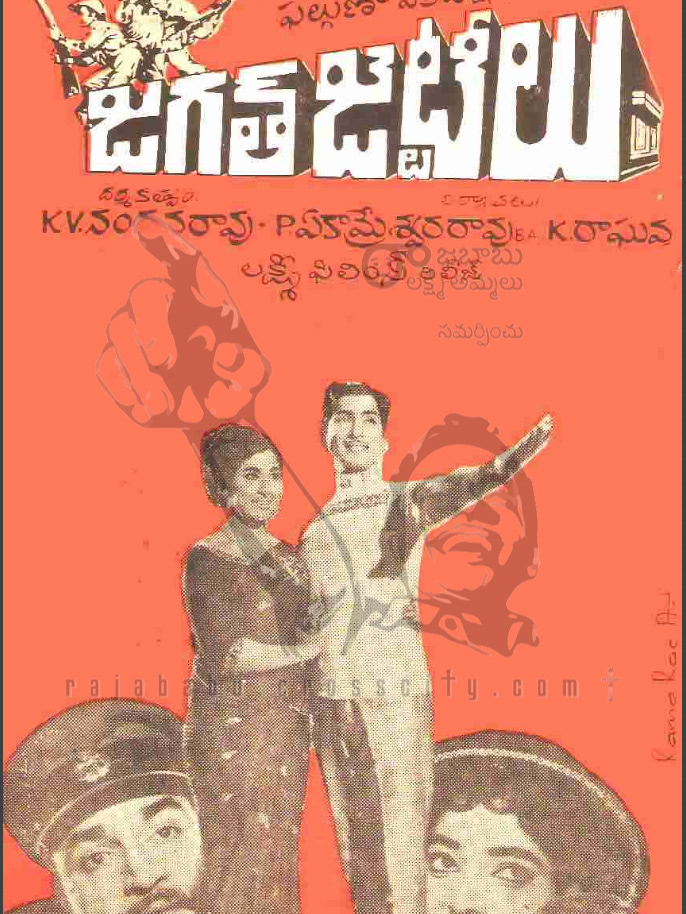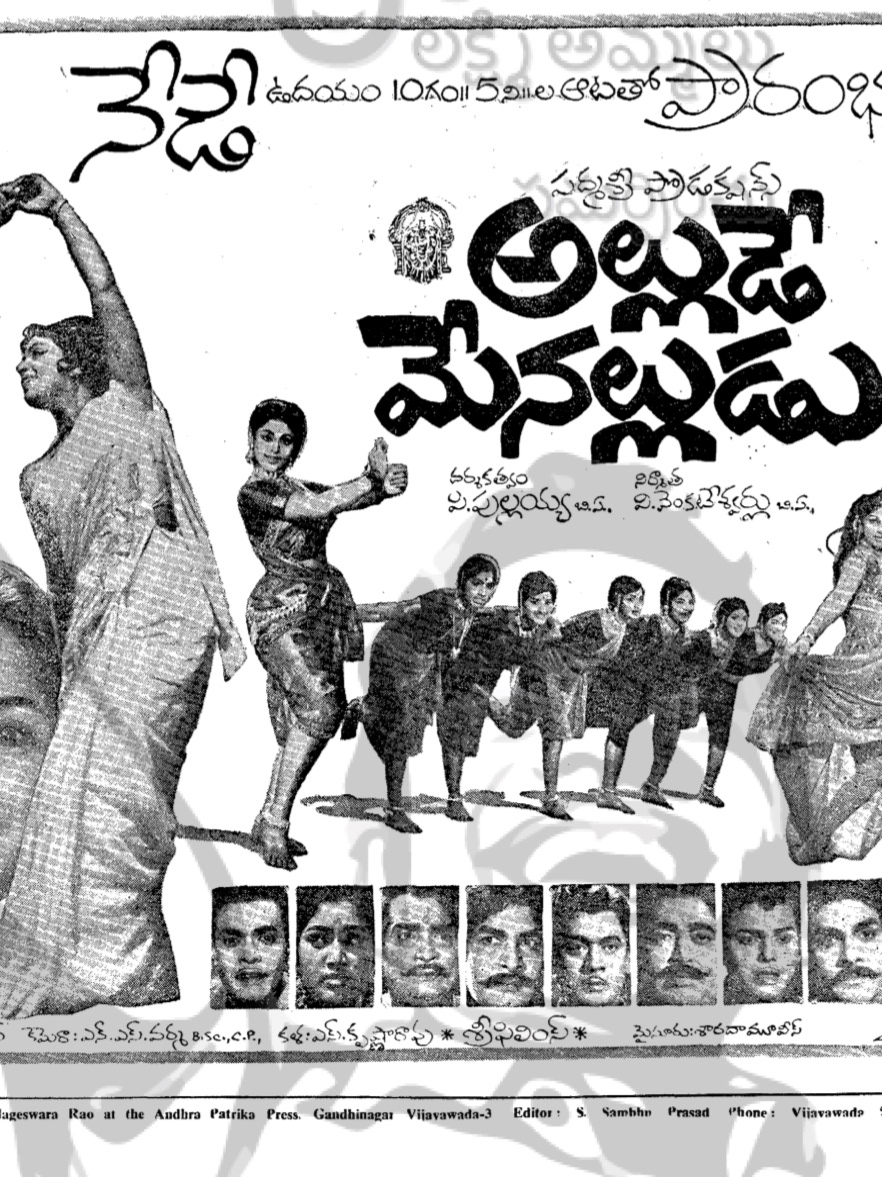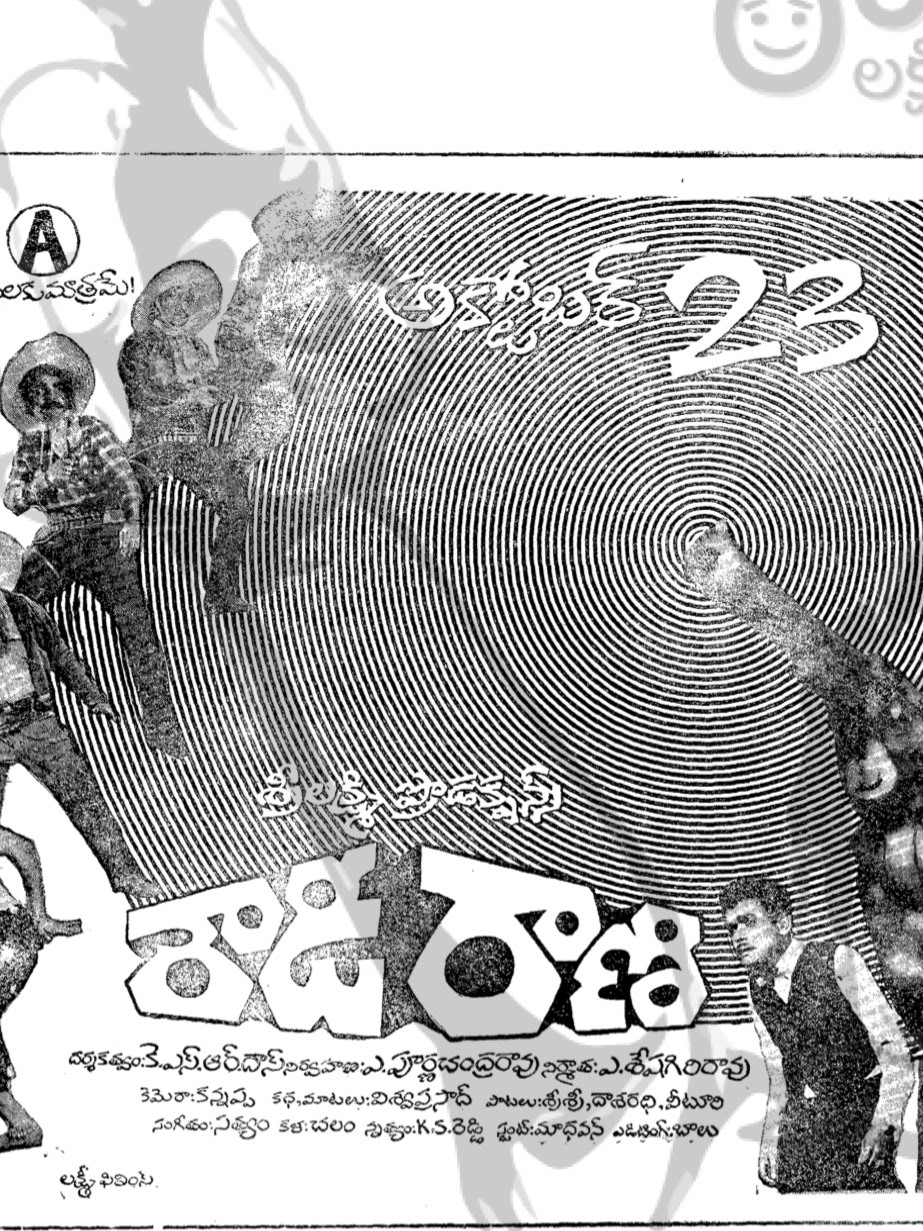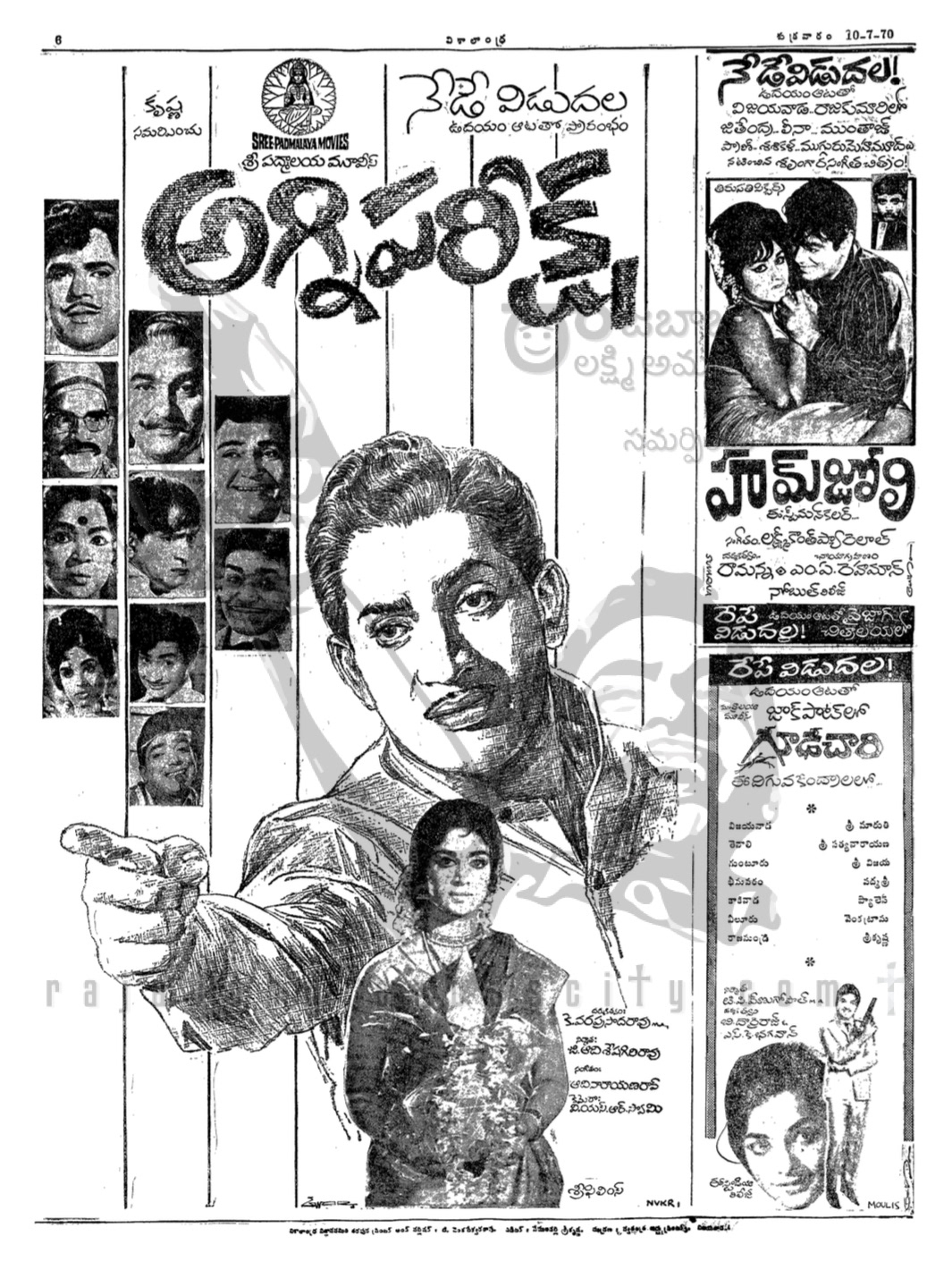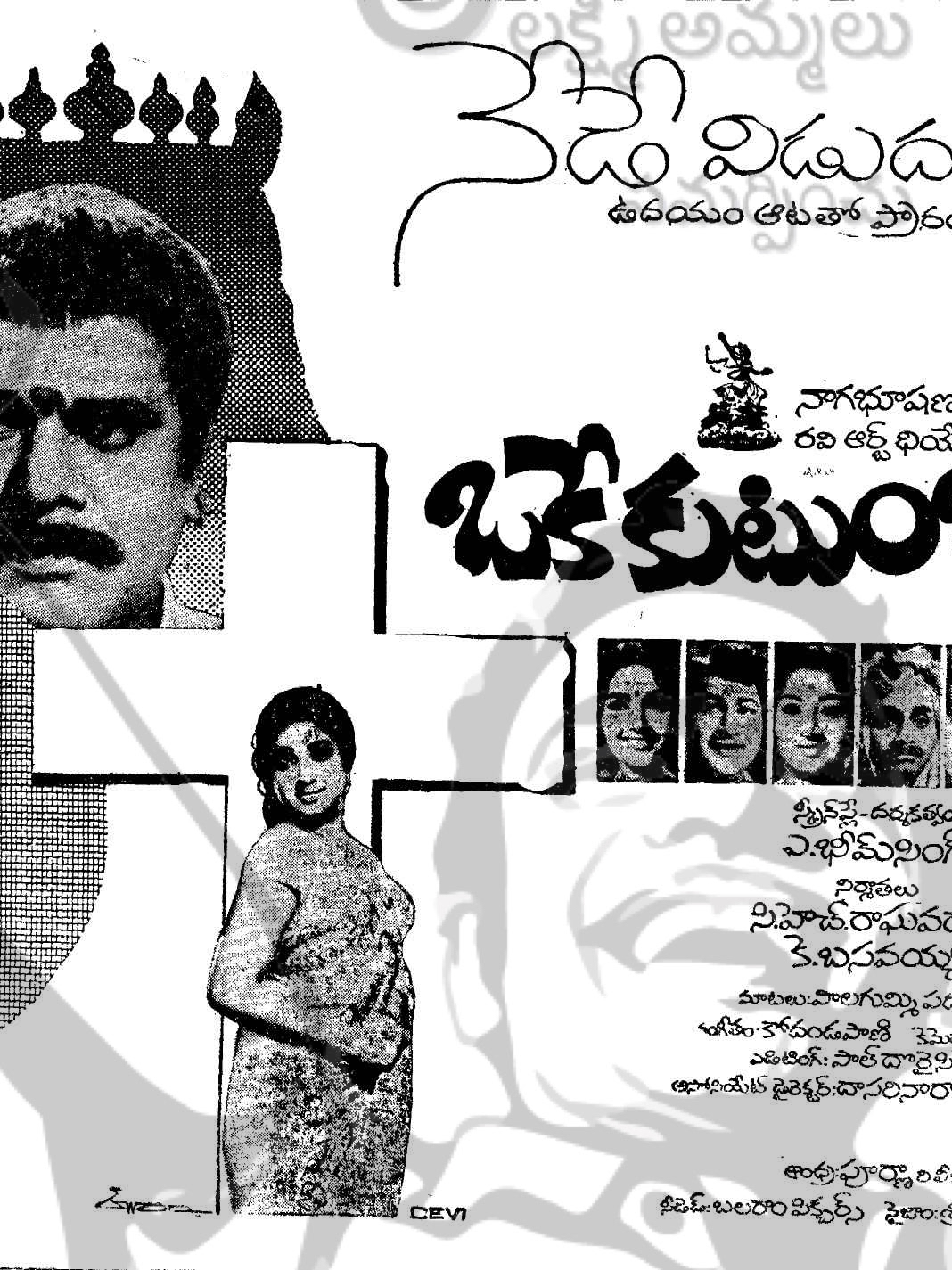Pelli Kuthuru
V. Ramachandra Rao
Country: India; Year: 1970; Language: Telugu
Studio: Sri Productions
Producer: Sundarlal Nahatha, P. Babji; Cinematographer: V.S.R. Swamy; Editor: N.S. Prakasam; Composer: S.P. Kodandapani; Lyricist: Kosaraju Raghavaiah Choudhury, Arudra, Dasaradhi, C. Narayana Reddy, Kodakandla Appalacharya, Gurajada Apparao
Cast: Krishna Ghattamaneni, Sowkar Janaki, Rajasri, Vijayanirmala, Geethanjali Ramakrishna, Relangi Venkataramaiah, Nagabhusanam, Krishnam Raju, M. Prabhakar Reddy, Rajababu, Chandramohan (Telugu Actor), Allu Ramalingaiah, Raavi Kondal Rao, G.S.R. Murthy, Kakarala, Chalapathi Rao, Chayadevi, Brindavana Chowdary, Udayalakshmi, T.G. Kamala Devi, SubbaLakshmi
Topic: Remake, Released
Release Date: April 17, 1970
Story: Kannadasan; Dialogue: Bhamidipati Radhakrishna Murthy
Singer: P. Susheela, L.R. Eswari, S.P. Balasubrahmanyam, Pitapuram Nageshwara Rao, Madhavapedhi Satyam
Art Director: S. Krishna Rao; Dance Director: Chinni-Sampath
Kosaraju Raghavaiah Choudhury (Lyricist)
(1905-87) Prolific Telugu lyricist born in Appikatla, Guntur Dist., AP. Influenced by Kondamudi Narasimham Panthulu, in whose play based on the Ramayana he acted when still in his teens. Worked as a journalist in the Raitu Patrika where he met the composer Samudrala Raghavacharya and the director Ramabrahmam. Published his first poetry anthology, Kadagandlu. Turned to film lyrics with Raitu Bidda (1939), including the song Nidramelkonara tammuda. Returned to films with humorous lyrics for K.V. Reddy’s Pedda Manushulu (1954), followed by one of his most famous songs, Jebulu bomma je jela bomma (in B.A. Subba Rao’s Raju Peda, 1954). Known for his earthy poetry, often referring to popular morality tales. Wrote lyrics for c.350 films.
Arudra (Lyricist)
(1925-98) Telugu poet and film lyricist born in Vizag, AP, as Bhagavathula Shankara Sastry. Started publishing poetry as a teenager, e.g. Loha Vihangalu. Initially influenced by radical poet Sri Sri. After a brief stint in the army, he became a professional writer under the name Arudra. Early writing was romantic, but became more political under the influence of the Telangana anti-zamindari movements (cf. Twamevaham). Major poetry anthologies include Kunalamma Padyalu (1964), Enchina Padyalu (1965) and Intinti Padyalu (1969). Also wrote patriotic songs during the India- China war (1962). Compiled an anthology of Telugu literature (Samagrandhra Sahityam). Film début in the Telugu version (Beedala Patlu) of Ramnoth’s classic Ezhai Padum Padu (1950). Made his reputation in films with Premalekhalu (1953), the Telugu dubbed version of Raj Kapoor’s Aah (1953). Described as the last of the pre-rock generation film lyricists. Recently worked for Bapu (Pelli Pustakam, 1991). Classic film lyrics anthologised by V.A.K. Ranga Rao in Kondagali Tirigindi.
Kannadasan (Story)
(1927-81) Prodigious Tamil poet, lyricist (over 5000 film songs) and producer. Key figure in the early DMK Film propaganda genre, often credited with reintroducing a classical Tamil literary ‘tradition’ to contemporary film audiences. Born as A.S. Muthaiah in Amaravatipudur, TN. Joined the journal Tirumakal (1944) which published his first poems. Published his own journals, the weekly Tenral, the monthly Mullai and the film journal Tenral Tirai; also edited the monthly Kannadasan and newspaper Katitam. Joined Modern Theatres’ story department (1947). Début as lyricist for Ramnoth’s Kanniyin Kathali (1949) but worked mainly as a dialogue writer until G.R. Rao’s Illara Jyothi (1954). Joined the DMK (1947-64); responsible for some of their main propaganda lyrics in e.g. N.S. Krishnan’s Panam (1952), T.R. Sundaram’s Thirumbi Paar (1953) and Yoganand’s MGR classic Madurai Veeran (1956). Founded Kannadasan Pics producing Malai Itta Mangai (1958), Sivagangai Seemai (1959), Kavalai Illatha Manithan (1960), Vanambadi (1963), etc. Became an independent star attraction after his successful lyrics in Bhimsingh’s early films, usually set to music by the Vishwanathan-Ramamurthy team (e.g. Ponal pokattum poda in Palum Pazhamum, 1961). Left the DMK after an argument with Karunanidhi, an incident often cited to indicate the degree to which personal rivalries between film people affected the DMK Party structure. Kannadasan later became a member of the Tamil Nadu Congress Committee. One of his last films is Balu Mahendra’s Moondram Pirai (1982). Other writings include 21 novels, 10 volumes of religious discourses and over 4000 poems (cf. Kannadasan, 1970).
Songs
NA
NA
